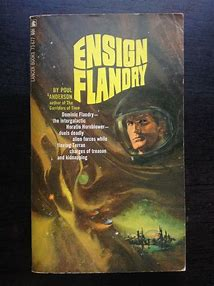Diplomatic language:
"...an invitation arrived. In the name of better understanding between races, as well as hospitality, would Ensign Flandry like to tour the planet in company with some young Merseians whose rank corresponded more or less to his?" (CHAPTER ELEVEN, p. 103)
Max Abrams has whisked Flandry from the barely habitable Starkad to the eminently terrestroid Merseia. Now Merseians offer a tour of the planet. Of course he would like it. However, Flandry is Abrams' aide. Abrams' interpretation of Merseian diplomatese is:
"'This is a baldpated ruse to cripple me still worse.'" (ibid.)
But Abrams lets Flandry go in the hope of learning something. After spending time with Tachwyr and others, Flandry:
"...believed they were honest, most of them, in their friendliness toward him and their expressed wish that today's discord could be resolved. They were good chaps. He felt more akin to them than to many humans.
"In spite of which, they served the enemy, the real enemy. Brechdan Ironrede and his Grand Council, who had put something monstrous in motion." (p. 108)
As in many situations on Earth, the problem is not the individuals on the other side but the regime that they serve.
Two observations about Abrams. First:
"...he felt he'd have been proud to have Dominic Flandry for a son." (p. 104)
If Abrams had lived long enough, then he would have had Flandry for a son-in-law.
Secondly, Abrams later thinks that:
"You had to see a place like this if you would understand, in your bones, that Merseians would never be kin to you." (CHAPTER FOURTEEN, p. 141)
Abrams has not shared Flandry's experience of drinking with Tachwyr the Dark and Lannawar Belgis.

5 comments:
Kaor, Paul!
Of course, in a situation like that described, anyone would be glad to enjoy a tour of Merseia!
I think you missed an obvious point, those Merseians who were Flandry's guides or "minders" were brought up to belief in that ideology of racial supremacism driving the Roidhunate. However friendly they were, personally, to Flandry, they willingly served Brechdan Ironrede and his Grand Council.
Recall how Abrams was older, more deeply educated, and far more experienced than was Flandry at that time. He was able to see more deeply into Merseians than Flandry was yet able to do. Meaning Abrams had no illusions about the Merseians, unlike Lord Hauksberg!
Ad astra! Seam
"Nothing personal" is often the case in conflicts between empires and Great Powers, from an individual's p.o.v.
My father-in-law fought the Germans in WWII, in a direct, personal sense; he was a BAR gunner in an infantry platoon.
His general opinion of them was that "they were just another bunch of poor unfortunate bastards like us, doing what they were told and trying to stay alive". And he respected their courage and skill. I think he felt closer to them in a way than to civilians, even the ones on his side.
My own father had similar opinions. He certainly preferred spending his time on leave in Germany or Spain, rather than France, when he was stationed there after the war!
Kaor, Mr. Stirling!
I agree, and that was certainly how Flandry thought, vis a vis the Merseians. He had no hesitation killing Merseians, when he had to. But, it was nothing personal, simply a regrettable part of his job helping to defend the Empire.
Interesting, that your father liked the Germans or Spanish, as individuals, than the French.
Merry Christmas! Sean
Sean: well, as a comment, my father noted that French-Canadian soldiers in the Canadian armed forces often refused to speak French in France because the locals would mock their accents.
Kaor, Mr. Stirling!
I can easily see that being the case! Many of the more snooty French derided the provincial, backwoods French of Quebec. Snobbery is immortal!
Merry Christmas! Sean
Post a Comment